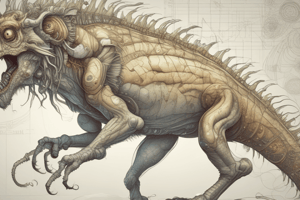Podcast
Questions and Answers
सेल जीवविज्ञान क्या अध्ययन करता है?
सेल जीवविज्ञान क्या अध्ययन करता है?
सेल जीवविज्ञान सेलों की भौतिक और रासायनिक गुणधर्मों का अध्ययन करता है, जो सभी जीवित वस्तुओं के मूल निर्माण खिलाड़ियों होते हैं।
जैविक विज्ञान क्या है?
जैविक विज्ञान क्या है?
जैविक विज्ञान जीवित जीवों का वैज्ञानिक अध्ययन है, जिसमें उनका संरचना, कार्य, वृद्धि, उत्पत्ति, विकास, वितरण और अनुकूलन शामिल है।
आनुवांशिकी के अध्ययन में कौन-कौन से तत्व शामिल हैं?
आनुवांशिकी के अध्ययन में कौन-कौन से तत्व शामिल हैं?
आनुवांशिकी जीवित जीवों में विरासत, परिवर्तन और विकास का अध्ययन है। यह जाँचता है कि जीन - डीएनए के क्षेत्र जो प्रोटीन के लिए कोड करते हैं, वे कैसे विरासत में मिलते हैं और आगे की पीढ़ियों में आगे कैसे जाता है।
संज्ञानात्मक जीवविज्ञान क्या अध्ययन करता है?
संज्ञानात्मक जीवविज्ञान क्या अध्ययन करता है?
Signup and view all the answers
माइक्रोबायोलॉजी का विषय क्या है?
माइक्रोबायोलॉजी का विषय क्या है?
Signup and view all the answers
जूलॉजी क्या अध्ययन करता है?
जूलॉजी क्या अध्ययन करता है?
Signup and view all the answers
बोटनी का अध्ययन क्या करता है?
बोटनी का अध्ययन क्या करता है?
Signup and view all the answers
वातावरण विज्ञान क्या है?
वातावरण विज्ञान क्या है?
Signup and view all the answers
विकास क्या है?
विकास क्या है?
Signup and view all the answers
शारीरिक विज्ञान क्या होता है?
शारीरिक विज्ञान क्या होता है?
Signup and view all the answers
Study Notes
Exploring Science: Focus on Biology
In this article, we'll delve into the exciting world of science by spotlighting its most vibrant subdiscipline: biology. From cellular biology to evolution, biology encompasses a vast network of interconnected concepts, each offering unique insights into the living world.
Biology: The Study of Life
Biology is the scientific study of living organisms, including their structure, function, growth, origin, evolution, distribution, and adaptation. It spans the gamut from molecules to ecosystems, and it is the foundation of our understanding of life. Its subfields include cell biology, genetics, microbiology, zoology, botany, ecology, evolution, and physiology.
Cell Biology
Cell biology examines the physical and chemical properties of cells, the basic building blocks of all living things. It explores topics like cell division, membrane transport, cell signaling, and cellular communication. The cell membrane that separates the cell from its environment plays a pivotal role in regulating these processes.
Genetics
Genetics is the study of heredity, variation, and evolution in living organisms. It investigates how genes—the segments of DNA that code for proteins—are inherited and how genetic information is passed from one generation to the next. Genetics has played a critical role in understanding the mechanisms of evolution and the genetic basis of inherited diseases.
Microbiology
Microbiology is the study of microorganisms, including bacteria, archaea, fungi, protozoa, and viruses. Microorganisms are the tiniest life forms on Earth, but they play a critical role in sustaining life through processes like decomposition, nitrogen fixation, and disease prevention.
Zoology
Zoology concerns the study of animals and their behavior, physiology, classification, and distribution. It includes topics like animal taxonomy, animal ecology, animal evolution, and animal behavior. Zoology is instrumental in understanding the phylogeny of various animal groups and the evolutionary relationships among them.
Botany
Botany is the study of plants and algae, including their classification, physiology, ecology, distribution, and evolution. Botany explores topics like plant taxonomy, plant physiology, plant ecology, and plant evolution. Botanists use their knowledge to better understand plant-human interactions and to develop sustainable agriculture practices.
Ecology
Ecology is the study of interactions among living organisms and between organisms and their environment. It addresses how organisms interact with each other and their surroundings through processes like competition, predation, parasitism, symbiosis, and adaptation. Ecology is essential for understanding the complex dynamics of ecosystems and the consequences of human impacts on nature.
Evolution
Evolution is the change in the genetic makeup of populations over time. It involves processes like natural selection, genetic drift, mutation, and gene flow. Evolutionary biologists study the mechanisms that drive change in the genetic makeup of populations and how these changes can lead to the emergence of new species.
Physiology
Physiology is the study of the functions and processes of living organisms. It examines the mechanisms underlying how organisms sense their environment, respond to internal and external stimuli, and maintain homeostasis. Physiology is central to understanding the fundamental principles of life and has applications in medicine and biotechnology.
In conclusion, biology offers an unparalleled view into the inner workings of the natural world. Its diverse subfields offer infinite opportunities for learning and exploration. From the tiniest cell to the grandest ecosystem, biology is the essential science that helps us understand life itself. By delving into biology, we expand our appreciation of our place in the natural world and the interconnectedness of all living things.
Studying That Suits You
Use AI to generate personalized quizzes and flashcards to suit your learning preferences.
Description
Take this quiz to test your knowledge of the diverse subfields of biology, including cell biology, genetics, microbiology, zoology, botany, ecology, evolution, and physiology. Challenge yourself with questions about the fundamental principles and interconnected concepts that define the study of life in the natural world.




